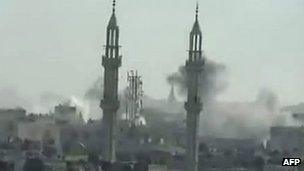Syria troops bombard Homs and other rebel areas
- Published

Homs has been under almost continuous attack since the ceasefire began last Thursday
Syrian security forces are carrying out deadly attacks on opposition-held areas in the north and south and continuing to bombard Homs, activists say.
Some opposition groups report that more than 50 people have been killed over the course of the day.
The violence came as envoy Kofi Annan travelled to Qatar to brief the Arab League on the peace plan he negotiated.
A handful of United Nations observers have made their first field trip to the south of the country to visit Deraa.
Earlier, the head of the advance team of UN observers admitted its ceasefire monitoring mission would be difficult.
"We need to move forward, little step by little step," Col Ahmed Himmiche of Morocco told reporters in the capital, Damascus.
"It is not easy and it will require co-ordination with all sides, firstly with the Syrian government and then with the other sides. It's a difficult mission that needs co-ordination and planning," he added.
Col Himmiche arrived on Sunday to prepare for a 30-strong mission approved by the UN Security Council to check the implementation of Mr Annan's peace plan, under which a ceasefire is supposed to have begun on Thursday.
'Flagrant violations'
As the Moroccan peacekeeper spoke, Syrian army tanks shelled the southern town of Basr al-Harir, killing at least two people and wounding dozens, activists said.
The town, about 70km (45 miles) south of Damascus, is reportedly a stronghold of the rebel Free Syrian Army (FSA).
Adel al-Omari, an activist in the area, told the Associated Press that troops had been shelling Basr al-Harir and the nearby rural region of Lajat since midday on Monday. He said the shelling was intensifying and that many residents were fleeing to nearby villages or to Jordan.
In the northern province of Idlib, security forces fired mortars and machine guns in two villages.
The Local Co-ordination Committees (LCC), an activist network, put the death toll in Idlib at 35. It said eight people had been executed in a field.
Government forces also continued to pound rebel-held districts of Homs, with the Syrian Observatory saying that mortar shells were landing at a rate of one a minute in Khaldiya and Bayada on Tuesday morning.
Homs has been under almost continuous attack since the ceasefire began and some activists are warning there may not be much left to see if the UN observers do not come soon, reports the BBC's Jim Muir in Beirut.
The military, tanks and heavy weapons were all supposed to have been withdrawn a week ago under Mr Annan's peace plan.
The opposition Syrian National Council (SNC) accused the government of "flagrant violations of the ceasefire" and called on the UN observers to "travel to Idlib and Homs immediately to see first-hand the massacres".
But the government said that "armed terrorist groups" had escalated their attacks leaving the authorities with no choice but to respond.
'Outside forces'
French Foreign Minister Alain Juppe said any ceasefire violation should be met with a swift and firm response by the UN Security Council.
Addressing an international conference on Syria in Paris, Mr Juppe also said that Western sanctions on the country were having an effect and that its foreign currency reserves had been halved. Syria's foreign reserves were estimated at $17bn (£10.7bn) before the uprising began last year.
Oil production has also been reduced by 30%, costing the government about $520m a month in revenue, according to French diplomats.
Mr Juppe said the Syrian government was actively trying to evade the sanctions, and called for a solid international response to such "manoeuvres".
But Russia, which was instrumental in persuading the Syrian government to accept the Annan plan and the ceasefire, seems to be backing the government line in blaming the rebels, our correspondent says.
"There are outside forces that are not interested in the success of the current UN Security Council effort," Russian Foreign Minister Sergei Lavrov said.
"They are doing their best to influence the Syrian opposition not to co-operate with the government in maintaining the ceasefire and setting up a future dialogue," he added.
The Arab League is meanwhile holding a ministerial meeting in Qatar, which Mr Annan is expected to attend to seek support for his plan.
However, the emir of Qatar, which has openly advocated arming the opposition, has given the initiative just a 3% chance of success.
"Earlier, we called for Arab military intervention to find a way out of the Syrian crisis, and spare the Syrian people further bloodshed. The appeals for help from a people oppressed and killed every day are met only with silence," Sheikh Hamad bin Khalifa Al Thani said on Monday.
The UN says about 9,000 people have died since pro-democracy protests began in March 2011. In February, the Syrian government put the death toll at 3,838 - 2,493 civilians and 1,345 security forces personnel.
